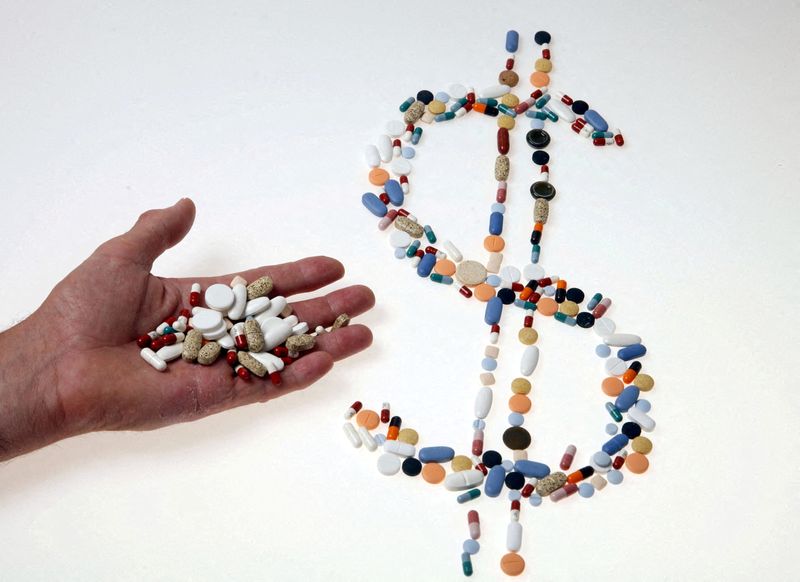By Michael Erman
NEW YORK (Reuters) - Injectable versions of some widely-used cancer drugs including Johnson & Johnson (NYSE:JNJ)'s blockbuster multiple myeloma treatment Darzalex are likely to be excluded from new U.S. government price negotiations for years, drugmakers told Reuters, protecting billions in revenue.
Whether the government agrees that adding an ingredient enabling infused drugs to be given by injection will allow them to be considered new medicines and significantly delay eligibility for price negotiations is being closely watched by Wall Street and the drugmakers.
J&J, Merck & Co, which is testing an injectable version of its top-selling immunotherapy Keytruda, and Halozyme (NASDAQ:HALO) Therapeutics, which licenses the critical new ingredient, hyaluronidase, for subcutaneous drugs, all told Reuters they believe the reformulation qualifies the medicines to be treated like new drugs.
Bristol Myers (NYSE:BMY) Squibb and Roche, which are developing versions for under the skin injection of cancer immunotherapies Opdivo and Tecentriq, respectively, said it was too soon to say.
President Biden’s signature Inflation Reduction Act (IRA) allows the government Medicare health program for the first time to negotiate prices for some of its most costly drugs, starting at a minimum discount of 25% to a drug's price. It aims to create $25 billion in annual savings by 2031 for a country that pays more for prescription medicines than any other.
Medicare, which serves Americans age 65 and older, is working on selecting 10 drugs for the first wave of negotiation on prices that would go into effect in 2026. They will be selected from medicines that have been on the market at least nine years - 13 years for more complex biotech drugs - without what the agency sees as ample direct competition.
Each year, Medicare will add more drugs to the list, the names of which have not yet been disclosed. In 2028, it will start negotiating on drugs that are typically given in a hospital setting like these.
The U.S. Centers for Medicare & Medicaid Services, which runs the Medicare program for more than 60 million Americans, declined to comment on whether it will consider older medicines that add hyaluronidase as new.
Evercore ISI biotech analyst Michael DiFiore said he expects Medicare to do so because hyaluronidase is an active ingredient that allows the body to absorb more of the drug when it is injected.
"That is unique specialized technology," DiFiore said.
When Medicare issued guidelines for negotiations earlier this year, it closed many loopholes that could have allowed drugmakers to game the system by making small changes to their drugs. Going from an immediate release to an extended release formulation would be one example of this, he said.
Injectable cancer treatments that include hyaluronidase are not that in that category, DiFiore said.
BILLIONS AT STAKE
J&J Chief Financial Officer Joseph Wolk, in an interview last week, said he does not expect the subcutaneous version of Darzalex, called Darzalex Faspro, to be eligible for negotiation until 2033 or 2034.
That could be five or more years beyond Darzalex, which will have been on the market for 13 years in 2028. Faspro, launched in 2020, already accounts for more than 80% of Darzalex revenue, which is due to rise to $9.5 billion this year.
Merck has said it hopes to launch its Keytruda injectable within a few years, with approval starting the 13-year clock until negotiation eligibility. The infused version of Keytruda could be subject to the program as soon as 2028.
Merck previously told Reuters it expects this version of Keytruda could replace the more time consuming infusion for most patients. Keytruda revenue is expected to top $24 billion this year and could exceed $30 billion as soon as 2026, according to analyst estimates.

San Diego-based Halozyme had $660 million in 2022 revenue. The company has said its expects revenue from subcutaneous drugs containing hyaluronidase to drive its growth going forward.
CEO Helen Torley said in Halozyme's opinion, Medicare has made its view on what defines separate drugs “very, very clear,” and that these injectables made with hyaluronidase will be treated as a new drug.